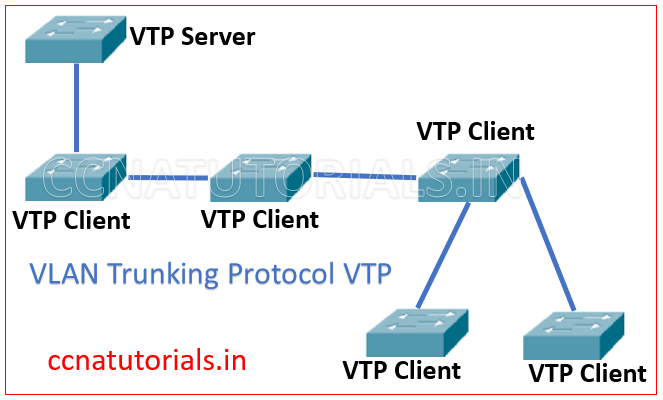Contents of this article
In this article I describe the VLAN Trunking Protocol VTP in networking. VLAN Trunking Protocol VTP manage all VLANs of a network. VLAN provides multiple virtual networks in a physical network. We can break a local area network into multiple virtual networks. The devices of same virtual network can communicate with each other without interfere to other virtual network. The switchports of a switch can be used as access port or trunk port. The function of access port and trunk port are different.
The switch provide a single broadcast domain to all connected devices by default. Each port of switch creates single collision domain. VLAN breaks the broadcast domain into small broadcast domain. If we need to make communication between different VLANs then we need a router. Router have the feature to provide communication between different networks. VLAN provides the logical network within a single physical network.
Every switchport works on separate collision domain. We can say each device connected with a switchport remains in separate collision domain. By default all switchports of a switch works in a single broadcast domain. It can be define as all the devices working in a single LAN remains in a single broadcast domain. The big network of single broadcast domain can be divided into different small broadcast domains by creating the VLANs in the network. Every VLAN have its own broadcast domain.
Breaking the large broadcast domain into small broadcast domains provides an extra layer of security in the network. The devices of different broadcast domains can not communicate with each other. The swithports can be configured to restrict the unauthorised use by unwanted devices. Management of networking devices become easier by creating VLANs. Network administrator can monitor the small network more efficiently than a large network.
You can add, delete and rename VLANs in a VTP enabled network. The information of VLANs broadcast by VTP enabled switches. VLAN Trunking Protocol VTP was created by Cisco. In VTP mode the VLANs works as a plug and play.
Important terms of VLAN Trunking Protocol VTP
There are two important terms related to VTP. The first one is VTP Server and second is VTP client. I describe both in details later in this article. By default all switches remains in VTP server mode. We require to define the domain name in the VTP server switch. A switch can use a single VTP domain at a time.
VTP required when there are multiple Switches and VLANs functioning in a network. If there is only single VLAN across the whole network, then there is no need of VLAN trunking Protocol VTP. You require to change the port mode to access mode before configuring the VTP on a switch-port. All switches use VLAN database to maintain the VLAN information in VTP mode. On getting the information of newly created VLAN, the existing VLAN database updated automatically.

There are three VTP modes available in any switch. You can see the modes by running the below commands in CLI of switch.
Switch(config)#vtp mode ? client Set the device to client mode. server Set the device to server mode. transparent Set the device to transparent mode.
VTP server mode
Server mode is the default mode for cisco switches. You can check the VTP status by running the command show vtp status. By default the result will be shown as below.
Switch>en Switch#show vtp status VTP Version : 2 Configuration Revision : 0 Maximum VLANs supported locally : 255 Number of existing VLANs : 5 VTP Operating Mode : Server VTP Domain Name : VTP Pruning Mode : Disabled VTP V2 Mode : Disabled VTP Traps Generation : Disabled MD5 digest : 0x7D 0x5A 0xA6 0x0E 0x9A 0x72 0xA0 0x3A Configuration last modified by 0.0.0.0 at 0-0-00 00:00:00 Local updater ID is 0.0.0.0 (no valid interface found) Switch#
You can see the VTP operation mode is server. The VTP domain name is not defined by default. Minimum one VTP server is required to propagate the VLAN information to all switches of the network. Any changes in VLAN or new created VLAN information advertise by the VTP server switch to all switches belongs to same VTP Domain. The VLAN information stored in NVRAM in the VTP server switch.

VTP Client Mode
Remember the client server architecture. Similarly in VLAN Trunking Protocol VTP the client controlled by the VTP server. The client switches received the VLAN information by the VTP servers and update the VLAN database. Client switch also forward the same information to next connected switches. The clients cannot add, delete or edit a VLAN. The VLAN information does not stored in NVRAM in client switches. So when you need to add a switch in a network. Change the mode of VTP to Client mode before adding it to an existing VTP enabled network.
VTP Transparent mode
We know how a switch works in VTP server or VTP client mode in a network. The third mode known as transparent mode allow a switch to keep away from VTP domain. We can say in transparent mode the switch remain separate from existing VTP domain. In transparent mode the switch do not advertise its VLAN database. You can say the VLAN data base of a VTP transparent mode switch is fully controlled by itself.
This article is just about the VLAN Trunking Protocol VTP. In next article I describe the configuration of VLAN Trunking Protocol VTP. I hope you understood the basic functionality of VTP. For any query or suggestion on this article you may contact us or drop a comment below. Your suggestions are always welcome by us.





